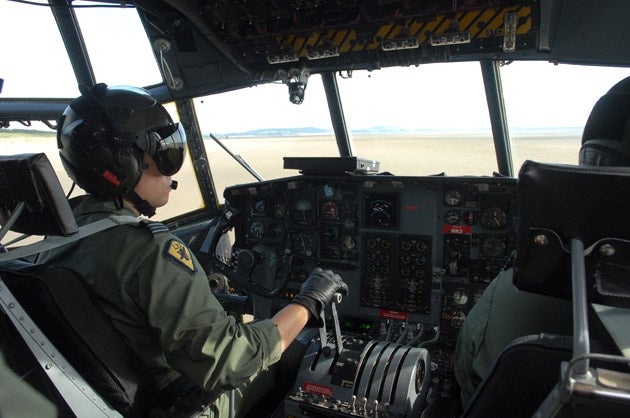The RAF is recruiting - and offers training to high-flying candidates in a wide range of field

For most of us, heading into a war zone might be a good enough reason to avoid a career; for Laura Hodson, it was an incentive."Going to Afghanistan was one of the main reasons I wanted to be in the RAF in the first place," says the 30-year-old RAF Reserves flight lieutenant and A&E nurse.
Hodson's job involves treating personnel overseas and ensuring their safe return back to the UK. "I really wanted to experience the pressure of working in an aeromedical evacuation role in the field," she says
For those who will be applying to join the RAF's 52,000-strong workforce this year, it's a recession-busting career move. As whole sectors suffer at the hands of the downturn, the RAF has just launched a recruitment campaign encouraging people to join up.
And, while the Government is urging us to re-train, some RAF careers allow you to gain recognised qualifications for free. All officers graduate from the RAF College Cranwell with a Level 5 Diploma from the Institute of Leadership and Management and many airmen and airwomen can earn NVQs from just completing their professional training.
The jobs crisis has made it more crucial than ever to have a back-up skill and being an RAF reserve officer can be a way to keep skills up to date. But you don't have to be a pilot. Approximately 77 per cent of the RAF's workforce is made up of ground personnel. Careers in the RAF range from airmen and women (including medical support, aircraft maintenance, administration and catering), to officers and non-commissioned aircrew.
The RAF encourages staff to continue their professional development throughout their careers, says Group Captain Gordon Bruce, the head of recruiting. "A lot of RAF training earns you civilian qualifications so, if you choose to leave, employers will be able to recognise the skills you can offer."
But there are other reasons to join, he emphasises, including the opportunity to travel the world, and a competitive salary.
Hodson first got involved with the force while studying nursing at university, and was a member of the University Air Squadron. When one of her friends became a pilot, he suggested training as an aeromedical evacuation nurse, so she joined the RAF Reserves on graduating.
Airmen, airwomen and non-commissioned aircrew do nine weeks' military training at RAF Halton in Buckinghamshire. Officers do 30 weeks' officer training at RAF College Cranwell in Lincolnshire. If you join as a professionally qualified officer (such as a doctor), your initial course of around three months at RAF Cranwell will include military training as well as fitness elements.
Hodson's own preparation consisted of basic recruit training and a Junior Management Leadership Course (JMLC). She has also independently completed a postgraduate diploma in tropical nursing at the London School of Hygiene and Tropical Medicine, which, she says, came in very handy during her deployment to Afghanistan in 2007.
Despite her willingness to go, Hodson says her time in Afghanistan was harder than she imagined. "We had to do a massive airlift operation from Kandahar," she explains. "We had 18 patients in total, two of whom were in a critical condition. They were all suffering from gunshot and shrapnel wounds. We needed to get them on to a C17 and get them back to the UK."
She says it was a far cry from her life in the NHS; it was hot, noisy and sometimes they had to work with limited equipment. "But it was an all-round brilliant experience," she says.
The RAF is not for everyone, though. "It can be a very stressful job," she says. "Sometimes you can be working really long hours with no sleep but there isn't anything like the feeling of knowing you're saving lives and helping the troops to do their job."
Subscribe to Independent Premium to bookmark this article
Want to bookmark your favourite articles and stories to read or reference later? Start your Independent Premium subscription today.

Join our commenting forum
Join thought-provoking conversations, follow other Independent readers and see their replies